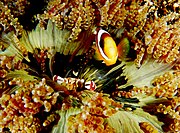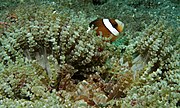Heteractis aurora
| Heteractis aurora | |
|---|---|

| |
| Scientific classification | |
| Kingdom: | Animalia |
| Phylum: | Cnidaria |
| Class: | Hexacorallia |
| Order: | Actiniaria |
| Family: | Stichodactylidae |
| Genus: | Heteractis |
| Species: | H. aurora
|
| Binomial name | |
| Heteractis aurora | |
| Synonyms | |
|
List
| |
Heteractis aurora is a species of sea anemone in the family Stichodactylidae.
Taxonomy[]
Common names for H. aurora include beaded sea anemone,[1] aurora host anemone, sand anemone, carpet anemone, flat anemone, corn anemone, Ritteri anemone, saddle tip anemone, adhesive sea anemone, and the white beaded anemone.
Description[]
Both the tentacles and oral disc of H. aurora are brown or purplish. The tentacles reach 50 mm in length, may be sticky when touched, and can have tips of a magenta colouration. The longer tentacles contain swellings. These appear on only on a single side, or almost entirely surrounding the tentacle, giving the appearance of beads on a string. A maximum of 20 such swellings may occur on any single tentacle.[1]
This species has a broad, flattened oral disc reaching 250 mm wide, and may have white or brown markings that radiate from the centre, and even continue up and along the tentacles.[1]
Distribution and habitat[]
H. aurora occurs in Micronesia as well as in Melanesia to East Africa. It is also present in the Red Sea, and in Australia to the Ryukyu Islands.[1] This species lives among coral, and along rocky reef edges and on slopes, normally in areas with strong currents. They attach themselves to a surface, and remain partially buried in sediment or sand,[1] When threatened, they may retract entirely out of view into the substrate.
Ecology[]
H. aurora hosts 7 species of anemonefish as symbionts: [1]
- Amphiprion akindynos – Barrier reef anemonefish
- A. allardi – Allard's anemonefish
- A. bicinctus – Two-band anemonefish
- A. clarkii - Clark's anemonefish
- A. chrysogaster - Mauritian anemonefish
- A. chrysopterus – Orange-fin anemonefish
- A. tricinctus – Three-band anemonefish
The relationship between anemonefish and their host sea anemones is highly nested in structure. With 7 species of hosted anemonefish, H. aurora is a generalist anemone,[2] however it is considered a nursery anemone as, for reasons unknown, sexually mature fish are rarely hosted by H. aurora.[1]
A number of other species are associated with H. aurora, however the relationship is commensal rather than mutual as the anemone does not appear to benefit from the association. These species are
- porcelain crabs
- Shrimp from the Periclimenes genus
- Threespot dascyllus
Gallery[]
H. aurora with shrimp & anemonefish

Amphiprion clarkii (Clark's anemonefish) with H. aurora, Timor

H. aurora, Panglao Island

Crab & anemonefish with H. aurora

Amphiprion clarkii (Clark's anemonefish) in H. aurora
References[]
- ^ a b c d e f g Fautin, Daphne G.; Allen, Gerald R. (1997). Field Guide to Anemone Fishes and Their Host Sea Anemones. Western Australian Museum. ISBN 9780730983651. Archived from the original on 14 April 2015.
- ^ Ollerton J; McCollin D; Fautin DG; Allen GR. (2007). "Finding NEMO: nestedness engendered by mutualistic organization in anemonefish and their hosts". Proc R Soc B Biol Sci. 274: 591–598. doi:10.1098/rspb.2006.3758. PMC 1766375. PMID 17476781.
External links[]
- Photos of Heteractis aurora on Sealife Collection
| Wikimedia Commons has media related to Heteractis aurora. |
| Wikispecies has information related to Heteractis aurora. |
- Stichodactylidae
- Animals described in 1833
- Taxa named by Jean René Constant Quoy
- Taxa named by Joseph Paul Gaimard
- Cnidarians of the Indian Ocean
- Cnidarians of the Pacific Ocean




